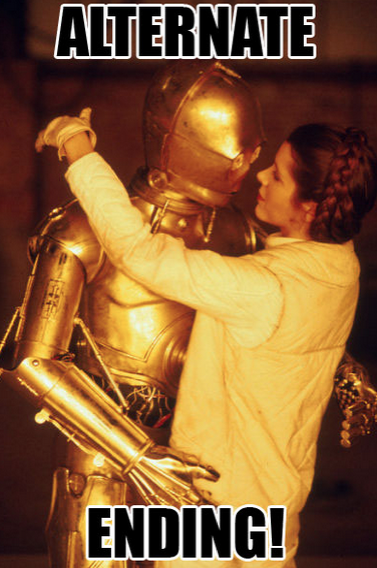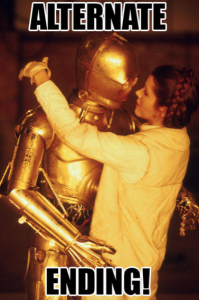Chekhov’s 12 Subversive Endings
Looking for direction in terms of writing good ending to my short story, Provocations of Light – part 1 and part 2 – my tutor encouraged us to check out some of Chekhov’s Subversive Endings:
1. Anti-epilogue
If an epilogue is a short statement about what happens to the characters after the story finishes, then an anti-epilogue is one that does not reveal what happens next, leaving us, the reading, in a state of uncertainty.
My Thoughts: I think this is the ending I am immediately drawn to because I actually have no idea how my story is going to end, thus it would save me having to scratch my head over working up a brilliant termination! I would still have to strengthen the narrative that I have, though, by revealing more key details about the plot and main character. For example, specifics of the Cattus Gene experiment, the female lieutenant’s role in the experiment, what ‘went wrong’, and more about things that happened to her in the past that confirm different aspects of her character.
2. Reverse Epilogues
If an epilogue tells us what will happen, a reverse epilogue tells us what has happened, implying that there will be no clear change in the future.
My Thoughts: This type of ending appeals to me because I could show that the reason my protagonist is in the complicated position she is in now, is due to similar behaviour in the past. In this way, this ending would suggest that my character is unable to learn lessons from the past, unable to change. I’m undecided if Lieutenant. Michelle Williams is ready for transformation.
3. Echo Endings
A story ends as it begins: by echoing what happened at the beginning of the story, thus implying nothing has changed
My Thoughts: I like this ending, but don’t feel it appropriate for my current short story. This is not simply a tale about everyday life on a spacecraft, followed by a climax, then back to everyday life. This is more about something incredible that happened in the past, prior to the start of the story, and now we feast on the impressive denouement.
4. Chiastic Endings
An echo ending that repeats the events of the beginning part of the story in reverse order.
My Thoughts: Too mathematical!
5. False Climaxes
What appears to be a climax, but is, in fact, an anti-climax whereby the the conflict of the plot remains unsolved, and the character remains unchanged.
My Thoughts: I’d like the complications of the plot to gradually unravel (as per ending 1). And I’m as yet undecided whether or not my character will go through the motions of change herself, or if things will simply change around her (as per ending 2).
6. Omitted Climaxes
Quite simply – no climax! The introduction of a complication or a conflict, and there the story ends!
My Thoughts: I like this climax for the build-up of tension and drama. Indeed, I feel the ending of my second draft was much like an omitted climax, i.e., she opens the door to her biggest fear and the story ends there!
7. External Climax
Omitting a climax in order to allow readers the freedom to continue the story in their imagination, to experience their own personal, external climax.
My Thoughts: I like the cerebral-ness of this ending. I feel that perhaps my second draft, as is, hints at an external climax where the reader is free to conjure up what may happen next. However, I think that the reader may have to make ‘too many’ guesses, as my story has a number of detail ‘gaps’ it should fill, (see ending 1) before I felt confident that an external climax would be appropriate.
8. Temporary Climax
A change that does not last, but that occurs temporarily (to the character).
My Thoughts: I’m an ‘all-or-nothing’ type of gal, so I don’t think this ending will work for my short story.
9. Complication-Creating Climaxes
A permanent change to a character’s disposition, or situation, which adds an extra layer of complication to the plot.
My Thoughts: The way my story is building, my character is grounded in strong beliefs, so this ending will not work for me.
10. Confliction-Creating Climaxes
Similar to the above, whereby the climax of a plot is followed by the creation of a new complication
My Thoughts: I like conflict, but I think there comes a point of wanting to be too fancy, and employing too much complication. I rule this out for my current short story.
11. Extended Anti-Climaxes
The climax occurs very early on in the story, thus becoming an extended anti-climax
My Thoughts: I’m not sure I could drag out one climax throughout the body of a story.
12. Shifts in Address, Tense and/or Point of View
As per the title, by abruptly shifting who is being addressed in the writing, the tense or point of view, one may create a subversive ending. Check out my post about Point of View in Creative Writing for a more detailed description.
My Thoughts: I’d definitely like to try a POV shift at the end of my story. One which shifts from the woman, to the creature, at the last moment. I think that could be very powerful, seeing the story concluded from the eyes of the creature. I will work on this.
My Short Story with Subversive Endings
Next, I would like to apply some of the Chekhov’s ‘subversive endings’ to my own story. Endings 1, 2, & 12 have potential. I may also ponder some Folktale Closings in terms of the the final sentences.
More about my experience with writing an ending soon!



This is a very grounded analysis of Chekhov’s subversive endings. I like that it has helped you shape your character even more. I would just warn you: open endings are nor the easiest option!!!! They are pretty difficult to write. I am very intrigued about the ending of your story. I look forward to reading it.